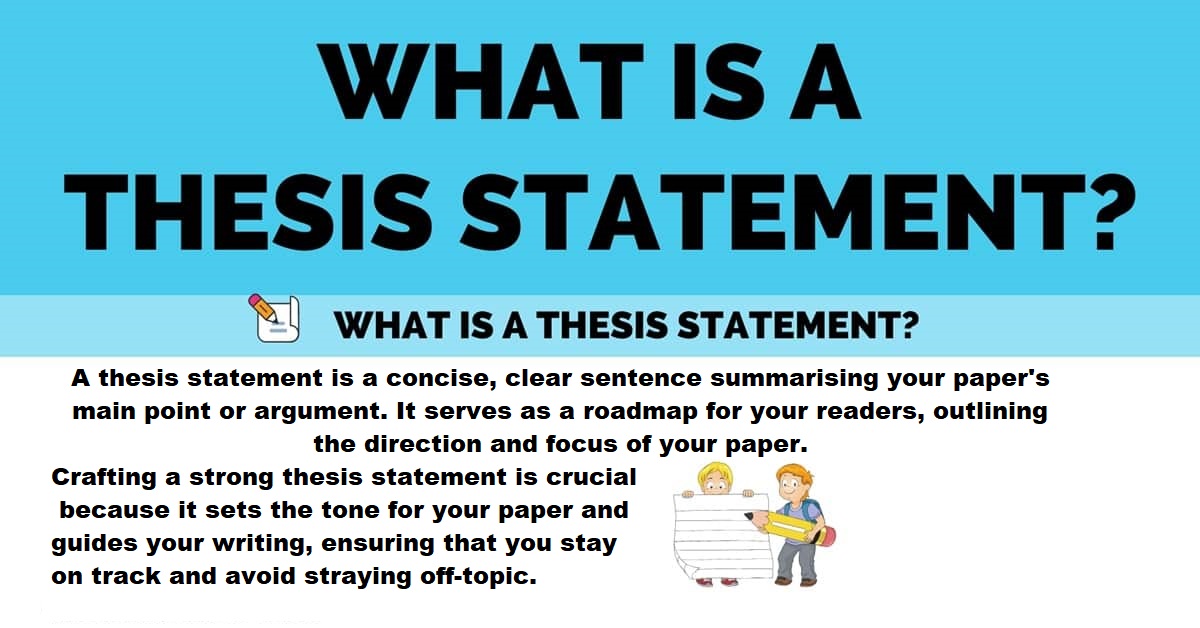- June 2, 2023
- Posted by: Thesis Africa
- Category: Thesis Dissertation Guide

Thesis Statement -4 powerful steps for Writing Academic Thesis Statement
Contents
Introduction
Crafting an effective thesis statement is the backbone of any successful academic paper. Whether a research essay or a term paper, a strong thesis statement is essential to guide your writing and clearly communicate your main argument to your audience. But what exactly is a thesis statement, and why is it so important?
A thesis statement is a concise, clear sentence summarising your paper’s main point or argument. It serves as a roadmap for your readers, outlining the direction and focus of your paper. Crafting a strong thesis statement is crucial because it sets the tone for your paper and guides your writing, ensuring that you stay on track and avoid straying off-topic.
This blog post will share tips and examples to help you craft an effective thesis statement for your academic writing. Whether you are a seasoned academic writer or just starting, this post will provide the tools to create a strong and effective thesis statement that will impress your readers and set your paper up for success. So, let’s dive in and start crafting!

What is a thesis statement?
A thesis statement is a critical component of academic writing that serves as a roadmap for your paper. It is a concise and clear statement that tells the reader what your paper is about, your main argument, and what points you will discuss. A thesis statement is usually found at the end of your introduction, setting the tone and direction for the rest of your paper.
There are different types of thesis statements, including argumentative, analytical, and expository. An argumentative thesis statement presents a debatable claim, while an analytical thesis statement analyzes an issue or concept. An expository thesis statement explains a concept or idea.
The purpose of a thesis statement is to help the reader understand the main focus of your paper and guide them towards the argument you will be making. It is the foundation upon which your entire paper is built, and it should be clear, specific, and well-crafted.
In academic writing, a thesis statement is important as it helps the writer stay focused and organized. It also helps the reader understand the paper’s central argument and provides a framework for evaluating the evidence and arguments presented. A strong thesis statement can distinguish between a well-structured, focused paper and a weak, disorganized one.
A thesis statement is a clear, concise statement that tells the reader what your paper is about and sets the tone and direction for your argument. It is a critical component of academic writing and serves as the foundation for a well-structured, focused paper.
Recommended: The Power of Outlining in Academic Writing: 6 Tips and Techniques for Success for International Research Students
Elements of an effective thesis statement
An effective thesis statement is a crucial aspect of academic writing that requires careful consideration and attention to detail. An effective thesis statement communicates the writer’s position on the topic and sets the tone for the entire paper. It must be clear and specific, arguable, relevant to the topic and purpose of the paper, and concise and to the point.
When writing a thesis statement, it is important to be clear and specific about the writer’s position. This means that the statement should not be vague or general but clearly state the writer’s stance on the issue. Additionally, the statement must be debatable, meaning there should be more than one perspective or interpretation. This engages readers and allows the writer to make a persuasive argument.
Another important element of an effective thesis statement is relevance. The statement should be relevant to the topic and purpose of the paper. This means that the writer should ensure that the statement is not too broad or too narrow but focused and specific to the research question. Additionally, it should be concise and to the point. This means the statement should clearly and succinctly express the writer’s perspective.
The elements of an effective thesis statement are crucial to the success of an academic paper. A thesis statement must be clear and specific, arguable, relevant to the topic and purpose of the paper, and concise and to the point. By focusing on these key elements, writers can craft effective thesis statements that set the tone for their papers and engage their readers meaningfully.
Tips for Crafting an effective thesis statement
Crafting a strong thesis statement is essential in academic writing, as it provides a clear direction and purpose for the paper. To ensure that your thesis statement is effective, there are a few key tips that you should keep in mind.
First, it’s important to take the time to brainstorm and outline your ideas before settling on a final thesis statement. This will help you to identify the key points you want to make in your paper and ensure that your thesis is relevant and specific to your topic.
Another important consideration is your audience and the purpose of your paper. Think about who your reader is and what they expect to gain from your work. This will help you to tailor your thesis statement to their needs and interests.
Additionally, don’t be afraid to experiment and revise your thesis statement as you work on your paper. It’s not uncommon for a thesis statement to evolve as you gain more insight and understanding about your topic.
Finally, seeking feedback and guidance from others, such as professors or peers, can be invaluable in crafting a strong thesis statement. They can provide fresh perspectives and help you to identify any weaknesses or areas for improvement in your statement.
Following these tips ensures that your thesis statement is clear, specific, and relevant to your topic and purpose, setting the stage for a successful and compelling academic paper.
Common mistakes to avoid in thesis statements
Crafting a strong thesis statement is crucial for academic writing, but it’s not always easy. There are several common mistakes to avoid to ensure that your thesis statement is compelling. One common mistake is being too broad or general, resulting in an unfocused thesis statement lacking specificity.
Conversely, being too narrow or specific can make it difficult to develop a compelling argument and provide enough evidence to support it.
Another mistake to avoid is using cliches or overly general language. These can make your thesis statement sound unoriginal and uninspired and may not accurately reflect the unique perspective you bring to your research. Additionally, failing to make a clear argument or take a clear position can weaken the impact of your thesis statement and fail to engage your audience.
To avoid these common mistakes, it’s important to carefully consider your paper’s purpose and audience, brainstorm and outline your ideas, and experiment and revise your thesis statement until it is clear, concise, and compelling. Seeking feedback and guidance from peers, instructors, or writing centre professionals can help refine your thesis statement and avoid common pitfalls.
By avoiding these common mistakes and following best practices for crafting an effective thesis statement, you can ensure that your research is focused, persuasive, and well-supported. Remember, your thesis statement is the foundation of your research, so taking the time to get it right is well worth the effort.
Conclusion
Crafting a strong thesis statement is an essential component of academic writing. A clear and concise thesis statement not only helps the writer stay on track and focus their arguments, but it also helps the reader understand the purpose and direction of the paper. In this post, we have discussed the definition and purpose of thesis statements, the elements of an effective thesis statement, tips for crafting a strong thesis, and common mistakes to avoid.
Remember that an effective thesis statement should be clear, specific, arguable, relevant, and concise. It should clearly state the writer’s argument or position and give the reader an idea of what to expect in the paper. By taking the time to brainstorm and outline, considering the audience and purpose of the paper, experimenting and revising, and seeking feedback and guidance, you can craft a strong and effective thesis statement that will elevate the quality of your academic writing.
Avoid common mistakes like being too broad or narrow, using cliches or overly general language, and failing to make a clear argument or position. A well-crafted thesis statement can make all the difference in the success of your paper.
The key to crafting an effective thesis statement is to take your time, think critically about your argument, and keep your audience in mind. By following the tips and examples outlined in this post, you can elevate the quality of your academic writing and create a strong thesis statement that will set the foundation for a successful paper.
We hope you enjoyed reading the content. Please do well to share and ask your questions using the comment section.
HIRE OUR WRITING SERVICE TODAY



[…] your introduction should be reaffirmed and discussed in your conclusion. The introduction’s thesis statement and its supporting details, as well as your emotional pitch and overall impression, should all be […]